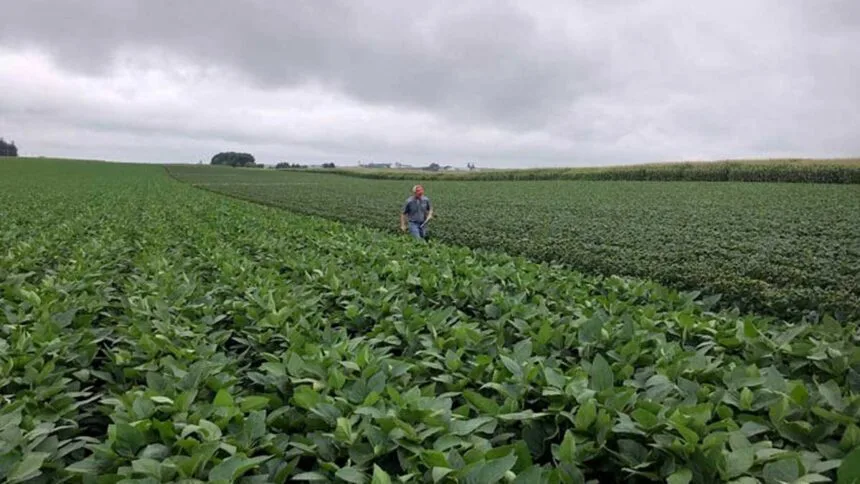Main Points In Hindi (मुख्य बातें – हिंदी में)
-
जलवायु-लचीली बीजों का वितरण: प्रधानमंत्री नरेंद्र मोदी ने अगस्त में 109 उच्च उपज, जलवायु लचीली और बायोफोर्टिफाइड फसल किस्में जारी की, जिनमें अनाज, दालें, फल, सब्जियाँ और वाणिज्यिक फसलें शामिल हैं। यह मौसम के बदलते पैटर्न और जलवायु परिवर्तन के प्रभावों का सामना करने के लिए किसानों की सहायता करेगा।
-
जलवायु परिवर्तन का कृषि पर प्रभाव: जलवायु परिवर्तन से कृषि को अनेक चुनौतियाँ झेलनी पड़ रही हैं जैसे सूखा, बाढ़ और तापमान में वृद्धि, जो फसल उत्पादन को प्रभावित कर रही हैं और खाद्य सुरक्षा को खतरे में डाल रही हैं।
-
किसानों के लिए आर्थिक संभावनाएँ: नई जलवायु-लचीली कृषि पद्धतियों को अपनाने से किसानों को जलवायु परिवर्तन से जुड़े जोखिमों का प्रबंधन करने में मदद मिलेगी, जिससे उनकी आय में वृद्धि और संसाधनों की दक्षता में सुधार होगा।
-
सार्वजनिक-निजी भागीदारी का महत्व: खाद्य हानि घटाने और जलवायु कार्रवाई को बढ़ावा देने के लिए सार्वजनिक-निजी भागीदारी को महत्वपूर्ण माना गया है। विभिन्न पहलों के माध्यम से जल संसाधनों और उर्वरकों की बचत करने की कोशिश की जा रही है।
- भविष्य की चुनौतियाँ और अवसर: जलवायु परिवर्तन के बढ़ते प्रभावों के बीच, टिकाऊ कृषि प्रथाओं की आवश्यकता अब और भी स्पष्ट हो गई है, जिससे न केवल खाद्य सुरक्षा बल्कि हमारे पारिस्थितिक तंत्र और अर्थव्यवस्थाओं के स्वास्थ्य को भी सुरक्षित रखा जा सके।
Main Points In English(मुख्य बातें – अंग्रेज़ी में)
Here are the main points derived from the provided text regarding Prime Minister Narendra Modi’s initiative related to resilient and biofortified crop varieties in response to climate change:
-
Release of High-Yield and Climate-Resilient Crop Varieties: In August, Prime Minister Narendra Modi announced the release of 109 high-yield, climate-resilient, and biofortified varieties of crops. This initiative aims to reduce farmers’ production costs and increase their profits.
-
Addressing Climate Change in Agriculture: The introduction of new seeds is a crucial measure to combat the impacts of climate change on agriculture. Changing weather patterns pose significant risks to crop yields, threatening food security for millions of people.
-
Global Hunger Crisis Risks: According to the Food and Agriculture Organization (FAO), failure to adopt new agricultural practices could exacerbate hunger, potentially affecting an additional 100 million people by 2030 due to climate change.
-
Challenges for Farmers in India: Approximately 120 million farmers in India, mainly with less than 5 acres of land, are increasingly at risk due to irregular rainfall, rising temperatures, and pest infestations, making climate-resistant seeds essential for their livelihoods.
- Importance of Multi-Stakeholder Collaboration: Efforts to promote sustainable agriculture and climate action require public-private partnerships. Collaborative initiatives have already shown positive outcomes, such as reducing food waste, conserving water, and saving fertilizers.


Complete News In Hindi(पूरी खबर – हिंदी में)
प्रधान मंत्री नरेंद्र मोदी ने अगस्त में फसलों की 109 उच्च उपज वाली, जलवायु लचीली और बायोफोर्टिफाइड किस्में जारी कीं। नई पर्यावरण-अनुकूल किस्मों से किसानों की उपज पर खर्च कम करने और मुनाफा बढ़ाने में अत्यधिक फायदेमंद होने की उम्मीद है। 61 फसलों की 109 किस्मों में 34 क्षेत्रीय फसलें और 27 बागवानी फसलें शामिल हैं। इनमें अनाज, बाजरा, दालें, तिलहन, फल, सब्जियाँ और वाणिज्यिक फसलें शामिल हैं।
कृषि पर जलवायु परिवर्तन के प्रभाव का मुकाबला करने के लिए नए बीजों को जारी करना एक महत्वपूर्ण पहल है। जबकि जलवायु परिवर्तन में कृषि का योगदान काफी है, मौसम और जलवायु पैटर्न में बदलाव का खामियाजा इस क्षेत्र को बड़े पैमाने पर भुगतने की संभावना है। जलवायु परिवर्तन कृषि के लिए अनेक चुनौतियाँ प्रस्तुत करता है। तापमान और वर्षा पैटर्न में बदलाव सीधे फसल की पैदावार को प्रभावित करते हैं, जिससे लाखों लोगों की खाद्य सुरक्षा को खतरा होता है। सूखा, बाढ़ और तूफान बढ़ते मौसम को बाधित करते हैं, जिससे किसानों को महत्वपूर्ण आर्थिक नुकसान होता है।
खाद्य और कृषि संगठन (एफएओ) के अनुसार, यदि देश नई कृषि पद्धतियों को अपनाने में विफल रहते हैं, तो जलवायु परिवर्तन 2030 तक अतिरिक्त 100 मिलियन लोगों को भूख की ओर धकेल सकता है। बायर क्रॉप साइंस की संगीता डावर कहती हैं, “जलवायु परिवर्तन आज हम सभी के सामने सबसे बड़ी चुनौतियों में से एक है। 2,000 किसानों के एक वैश्विक सर्वेक्षण के अनुसार, 75 प्रतिशत जलवायु परिवर्तन की वास्तविकता को पहचानते हैं और सहमत हैं कि अनुकूलन आवश्यक है।
जैसे-जैसे जलवायु परिवर्तन तीव्र हो रहा है, भारत के लगभग 120 मिलियन किसान – जिनमें से अधिकांश के पास 5 एकड़ से कम भूमि है – अनियमित वर्षा पैटर्न, बढ़ते तापमान और बढ़ते कीट संक्रमण के कारण अपनी आजीविका को खतरे में देख रहे हैं। चूंकि भारत जलवायु प्रभावों के प्रति सबसे अधिक संवेदनशील देशों में से एक है, इसलिए नए जलवायु प्रतिरोधी बीज किसानों, लोगों की भलाई के साथ-साथ निर्यात सुनिश्चित करने के लिए आवश्यक हैं।
कृषि पर जलवायु परिवर्तन के आर्थिक प्रभावों को बढ़ा-चढ़ाकर नहीं बताया जा सकता। जो किसान जलवायु-लचीली प्रथाओं को अपनाते हैं, वे जलवायु परिवर्तनशीलता से जुड़े जोखिमों का प्रबंधन करने के लिए बेहतर ढंग से सुसज्जित होते हैं। इसके अलावा, जलवायु-लचीली कृषि पद्धतियों को अपनाने से संसाधन दक्षता में वृद्धि होती है। नई दिल्ली में बिल एंड मेलिंडा गेट्स फाउंडेशन के साथ रणनीतिक साझेदारी में भारत के सबसे बड़े एकीकृत अनाज वाणिज्य मंच, आर्य.एजी द्वारा आयोजित रिथ शिखर सम्मेलन के दूसरे संस्करण में बोलते हुए, कृषि क्षेत्र में एक भारतीय स्टार्ट अप, ओमनिवोर के सुभादीप सान्याल ने कहा, “कृषि में, अगर हम प्रकृति के संबंध में स्थिरता को प्राथमिकता नहीं देते हैं, तो इसका सीधा असर हमारी संपत्तियों पर पड़ेगा और परिणामस्वरूप, बाजार पर। निवेश का मूल्यांकन करते समय आर्थिक स्थिरता हमारे लिए एक महत्वपूर्ण कारक है, हमारा ध्यान किसानों की आय बढ़ाने और उन्हें वित्त तक बेहतर पहुंच प्रदान करने पर है।”
आर्य.एजी के सह-संस्थापक चट्टाननाथन देवराजन ने भोजन के नुकसान को कम करने, जलवायु कार्रवाई के लिए बहु-हितधारक सहयोग को बढ़ावा देने और टिकाऊ सोर्सिंग के लिए एक डिजिटल प्लेटफॉर्म विकसित करने के लिए सार्वजनिक-निजी भागीदारी के महत्व पर जोर दिया। “हमने जलवायु कार्रवाई में योगदान देने के लिए उत्तर प्रदेश और असम की राज्य सरकारों के सहयोग से सार्वजनिक-निजी भागीदारी (पीपीपी) मॉडल को सक्षम किया है। इन पहलों से खाद्य हानि में 7 प्रतिशत की कमी आई है, 12 मिलियन लीटर पानी का संरक्षण संभव हुआ है और 48,000 किलोग्राम उर्वरक की बचत हुई है।” ग्रामीण विकास मंत्रालय में डीएवाई-एनआरएलएम के निदेशक रमन वाधवा कहते हैं, “हमारे प्रयासों को अधिक जलवायु-लचीला बनाने के लिए सहयोग महत्वपूर्ण है। कोई भी इससे अकेले नहीं निपट सकता; जलवायु कार्रवाई को आगे बढ़ाने के लिए हमें बहु हितधारक भागीदारी की आवश्यकता है। जलवायु संकट एक तात्कालिक ख़तरा है और अगर हमने कार्रवाई नहीं की तो इसकी आर्थिक कीमत बहुत ज़्यादा होगी। हालाँकि, हम इस चुनौती को अवसर में बदल सकते हैं।”
जैसे-जैसे दुनिया जलवायु परिवर्तन के बढ़ते प्रभावों से जूझ रही है, कृषि क्षेत्र एक महत्वपूर्ण चौराहे पर खड़ा है। जलवायु-लचीली कृषि की तात्कालिकता कभी इतनी अधिक स्पष्ट नहीं रही। बढ़ते तापमान, अप्रत्याशित मौसम पैटर्न और चरम मौसम की घटनाओं की बढ़ती आवृत्ति के साथ, टिकाऊ कृषि पद्धतियों की आवश्यकता न केवल खाद्य सुरक्षा के लिए बल्कि हमारे पारिस्थितिक तंत्र और अर्थव्यवस्थाओं के स्वास्थ्य के लिए भी आवश्यक है।
Complete News In English(पूरी खबर – अंग्रेज़ी में)
In August, Prime Minister Narendra Modi launched 109 new crop varieties that are high-yielding, climate-resilient, and biofortified. These environmentally-friendly varieties are expected to significantly help farmers reduce costs and increase profits. Among these 109 varieties from 61 crops, there are 34 regional crops and 27 horticultural crops, including grains, millet, pulses, oilseeds, fruits, vegetables, and commercial crops.
Releasing new seeds is a crucial step in combating the effects of climate change on agriculture. While agriculture contributes to climate change, the sector is likely to suffer the most from changes in weather and climate patterns. Climate change poses numerous challenges for farming, as shifts in temperature and rainfall directly impact crop yields, threatening food security for millions. Increasing incidents of drought, floods, and storms disrupt farming, resulting in significant economic losses for farmers.
According to the Food and Agriculture Organization (FAO), if countries fail to adopt new agricultural practices, climate change could push an additional 100 million people into hunger by 2030. Sangeeta Davor from Bayer Crop Science states, “Climate change is one of the biggest challenges we face today. According to a global survey of 2,000 farmers, 75% recognize the reality of climate change and agree that adaptation is necessary.”
As climate change intensifies, roughly 120 million farmers in India—most of whom own less than 5 acres of land—are facing threats to their livelihoods due to unpredictable rainfall, rising temperatures, and increased pest infestations. Since India is one of the most vulnerable countries to climate impacts, new climate-resistant seeds are essential for farmers, ensuring their well-being and exports.
The economic impacts of climate change on agriculture cannot be overstated. Farmers who adopt climate-resilient practices are better equipped to manage the risks associated with climate variability. Additionally, implementing climate-resilient agricultural methods improves resource efficiency. While speaking at the second edition of the Rith Summit organized by Ary.Ag, India’s largest integrated grain commerce platform in collaboration with the Bill & Melinda Gates Foundation, Subhadip Sanyal from the startup Omnivore emphasized the importance of prioritizing sustainability in agriculture. He said, “If we do not prioritize sustainability in relation to nature, it will directly affect our assets and, as a result, the market. When evaluating investments, economic stability is critical for us, and we focus on increasing farmers’ incomes and providing better access to finance.”
Chattanathan Devarajan, co-founder of Ary.Ag, highlighted the importance of public-private partnerships in reducing food waste, promoting multi-stakeholder collaboration for climate action, and developing sustainable sourcing digital platforms. “We have enabled a public-private partnership (PPP) model in collaboration with the state governments of Uttar Pradesh and Assam to contribute to climate action. These initiatives have led to a 7% reduction in food waste, saved 12 million liters of water, and saved 48,000 kilograms of fertilizer.” Raman Vadhwa, director of DAY-NRLM at the Ministry of Rural Development, said, “Collaboration is critical to making our efforts more climate-resilient. No one can tackle this alone; we need multi-stakeholder partnerships to advance climate action. The climate crisis is an immediate threat, and if we don’t act, the economic cost will be very high. However, we can turn this challenge into an opportunity.”
As the world grapples with the growing impacts of climate change, the agricultural sector stands at a critical crossroads. The urgency for climate-resilient agriculture has never been clearer. With rising temperatures, unpredictable weather patterns, and increasing frequency of extreme weather events, the need for sustainable farming practices is essential not only for food security but also for the health of our ecosystems and economies.


 By
By 





